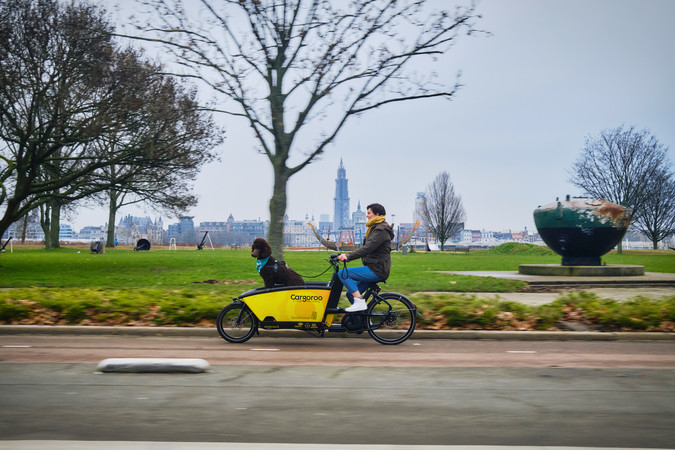We interviewed CIE member Jaron Borensztajn, Co-Founder of Cargoroo. As an active member of CIE's Expert Groups on Bike Share and Cargo Bikes and Cycle Logistics, we wanted to hear and share his thoughts of the future, challenges and inspirations in the cycling industry.
1. Can you give us a brief description of Cargoroo?
Cargoroo is a cargo bike sharing company. We offer city inhabitants and small businesses the opportunity to use shared cargo bikes instead of their personal cars or delivery vans. Our purpose is to make cities more livable by moving to a healthier and sustainable mode of transport.
We place our shared electric cargo bikes in cities, primarily in dense urban areas. We use fixed locations so that people can easily find them. They can be used via an app with an electronic lock, which means you can easily rent and ride it for 10 minutes, an hour, all day – you pay for what you use, and people are usually very happy with this! We’re currently operating in several cities across the Netherlands and Belgium, we just started in the UK and are going to launch in Germany this year.
2. What cycling trends are you most excited to see by the year 2030?
I think cycling will be much more mainstream in countries where it's not as mainstream yet. Of course, it’s mainstream in the Netherlands, but not yet everywhere else. However, it’s a trend we already see happening now and I believe it's going to get stronger by 2030.
I also think that shared bikes are going to become a mainstream phenomenon, perhaps not for the primary bike people use 10 times a day, but for the special instances where users only need one a few times a month or year – think race bikes, cargo bikes or delivery bikes. Given its great accessibility, shared bikes have the potential to solve these specific use cases.
3. What do you see as a major challenge in the cycling industry, and how can CIE play a role in overcoming that challenge?
I think the main thing for cycling is that a large part of the market is now in leisure and sports – if you compare the cycling industry to the car industry, there are sports cars, of course, but this is a minor segment in the car market. I think the utility use of bikes needs to position itself as the main and larger part of the market. This is the case in the Netherlands, where the bike acts as the primary vehicle in terms of transport, and this should be the case in every country in Europe. I think in positioning the bike as the first vehicle of choice, for both personal transport and cargo transport, that's the challenge in the cycling industry.
Another challenge for the industry is to improve the reliability of bikes. What we see is, cars have a maintenance control interval of around 20,000 kilometers, whereas bikes have around 1,000 kilometers, which is simply not good enough if you want to use and rely on it every day. This is a major challenge for the bike industry to achieve this comparative reliability.
Positioning the bikes, that's politics and a major role for CIE. There’s a need for lobbying and showcasing bikes as the solution to almost every transport problem. We use the slogan no car no problem because the mobility transition shouldn’t be from old-fashioned fuel-based cars to electric cars, but a from cars to bikes. I think this is something in which CIE should promote much more on a political level, and perhaps on a marketing level to all users.
4. What or who in the cycling industry inspires you?
There are ambassadors in specific countries advocating for cycling, one being the mayor of Paris, Anne Hidalgo. She’s a major proponent of biking and is willing to invest to make cycling a normal activity in the city of Paris, as opposed to a niche activity. I find these advocates who are promoting and implementing cycling on a political level inspiring.
And of course, companies that promote cargo bikes inspire me, such as Urban Arrow, who is the first major company to normalize transport bikes. If you look around Amsterdam, most of the package deliveries are now by cargo bike, which was unthinkable just 5 years ago. Where you would see motorized vehicles delivering packages, we now see cargo bikes being used as the standard, which is also very inspirational.
5. Describe in 5 words how cycling is saving the world.
We challenged Jaron to tell us how cycling is saving the world - in only five words:
No Car, No Problem!
 Learn more about cargo bike sharing with Cargoroo at cargoroo.nl #letscargoroo
Learn more about cargo bike sharing with Cargoroo at cargoroo.nl #letscargoroo
